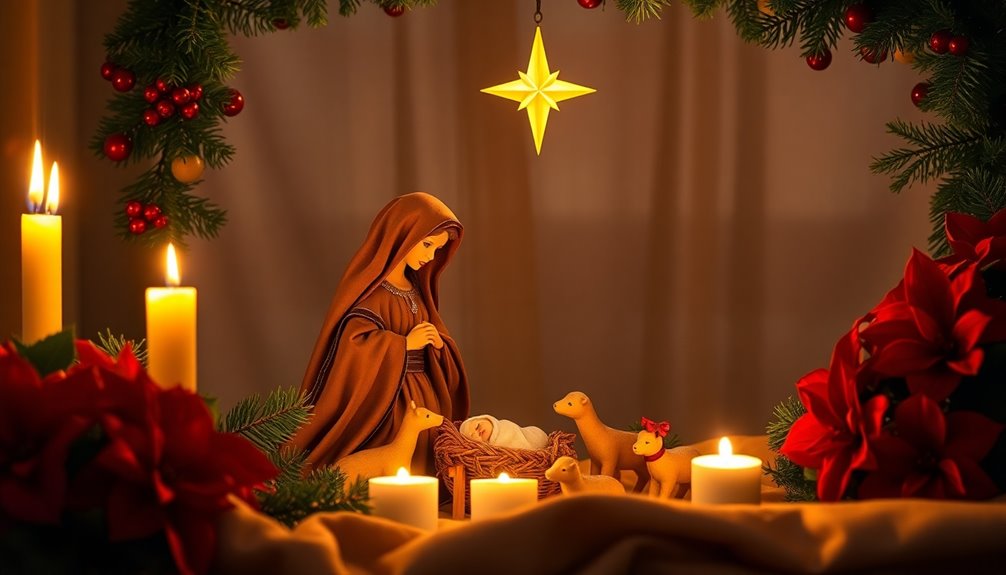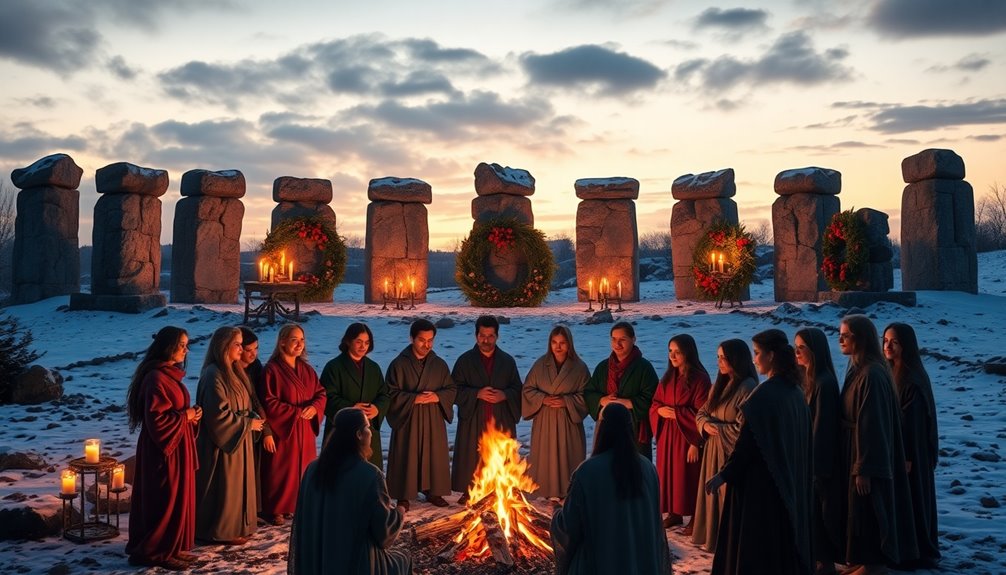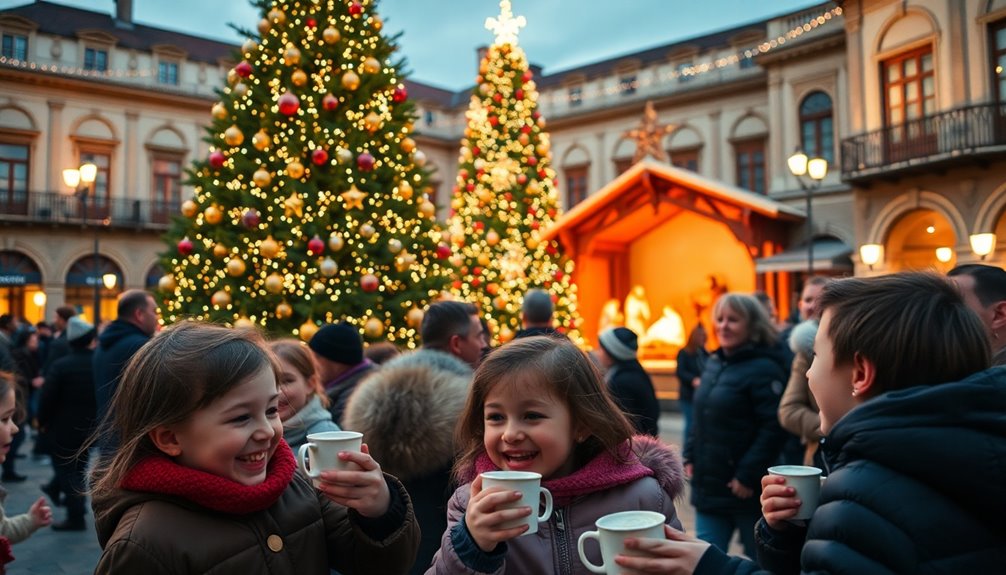The true meaning of Christmas revolves around love and kindness, highlighted by the birth of Jesus Christ. It's a time to reflect on God's gift of grace and the importance of community. You're encouraged to share, serve, and strengthen your relationships, turning this festive season into a powerful reminder of compassion and hope. While exchanging gifts and enjoying traditions, remember the larger purpose behind these acts: embodying love and joy in your interactions with others. This holiday not only celebrates Jesus' arrival but also calls on you to make a positive impact in your community, and there's so much more to explore.
Key Takeaways
- Christmas celebrates the birth of Jesus Christ, symbolizing God's divine love and incarnation.
- It encourages acts of love, service, and sharing with others, fostering community bonds.
- The holiday reflects a time for gratitude, forgiveness, and reassessing one's life and faith.
- Historical origins blend ancient traditions with the formal celebration established by the Latin Church.
- Acts of kindness and community service embody the spirit of giving, reinforcing compassion during the season.
Introduction

What does the true meaning of Christmas really mean to you? For many, el verdadero significado de la Navidad es el amor divino que se manifiesta en el regalo de Jesucristo a la humanidad.
Celebramos el nacimiento de Cristo no solo como un evento histórico, sino como un recordatorio profundo de la encarnación de Dios, quien vino a ofrecer salvación y gracia a todos.
La Navidad es una época en la que se nos invita a reflexionar sobre la importancia de compartir y servir a los demás. A través del intercambio de regalos, recordamos que el amor y la apreciación que mostramos hacia los demás son reflejos de ese amor divino que se nos ha dado.
Este tiempo también nos anima a fortalecer nuestras relaciones familiares y comunitarias, y a ayudar a los menos afortunados.
Así, al celebrar la Natividad de Jesucristo, no solo conmemoramos su llegada, sino que también renovamos nuestro compromiso de vivir en amor y servicio, reconociendo que la verdadera esencia de la Navidad es un llamado a la acción hacia la salvación y la gracia que él nos ofrece.
Biblical Basis for Christmas

When you explore the biblical basis for Christmas, you'll find rich references that highlight its significance.
Key verses, like Isaiah 9:6 and John 1:14, emphasize the birth of Jesus as the fulfillment of God's promises.
These scriptures remind you of the deeper spiritual truths behind the celebration, beyond just the traditions.
Primary Bible References
Often, the primary Bible references that highlight the true meaning of Christmas reveal profound truths about Jesus' birth and its significance. The nacimiento de Jesús, as foretold in Isaiah 9:6-7, marks the fulfillment of God's promises and the arrival of our Savior. This event brings immense alegría in heaven, as the heavenly hosts proclaim peace on earth (Luke 2:13-14).
At the heart of the Navidad cristiana lies the amor y gracia de Dios, shown through John 3:16-17, where God offers salvation to humanity instead of condemnation. This reflects the verdadero significado de la Navidad: a gift of esperanza and the promise of vida eterna for all who believe (Romans 5:8).
As you celebrate el 25 de diciembre, remember that this day signifies more than just a holiday; it represents a transformative spiritual renewal heralded by el nuevo pacto (Ezekiel 11:19-20).
Embracing these primary Bible references will deepen your understanding of Christmas and its lasting impact on your life, inviting you to share in the joy, hope, and love that Jesus brings.
Secondary Bible References
Secondary Bible references provide a deeper understanding of the biblical foundation for Christmas, highlighting the significance of Jesus' birth in the context of God's redemptive plan.
In the celebration of Navidad, you can see how the nacimiento de Cristo fulfills Old Testament profecías. Isaiah 9:5, for instance, speaks of a child born to us, called Wonderful Counselor and Prince of Peace, emphasizing the profound significado of His arrival.
Luke 2:13-14 amplifies this by showcasing the heavenly host proclaiming peace on earth at Jesus' birth, which reflects the divine purpose behind the Navidad cristiana.
Matthew 1:21 further clarifies that Jesus came to save His people from their sins, reinforcing the theme of redención central to the Christmas narrative.
John 1:14 beautifully illustrates the incarnation, stating, "The Word became flesh," underscoring Jesus' divine nature.
Galatians 4:4-5 highlights the perfect timing of His birth, sent to redeem those under the law.
Together, these secondary references deepen your appreciation for the love and hope embodied in Christmas, reminding you of the true essence of this cherished celebration.
Pagan Winter Solstice Celebrations

Celebrating the winter solstice has deep roots in pagan traditions, with rituals and festivities that honor the return of light during the darkest time of the year. Around December 21, cultures marked this solstice as a moment of hope, celebrating the gradual return of sunlight.
Ancient celebrations like Saturnalia in Rome included feasts, music, and an intercambio de regalos, reflecting a spirit of renewal.
Many modern traditions of Navidad, such as decorating trees, stem from these pagan festivities. People engaged in these rituals not only to celebrate the solsticio de invierno but also to ensure fertility for the coming year.
As early Christians sought to establish their own celebrations, they strategically chose December 25 to commemorate el nacimiento de Jesús, blending these pagan customs with their faith.
Over time, the customs surrounding the solstice evolved and merged with Christian traditions, leading to the Christmas we know today. The focus on hope and renewal remains central, reminding us that even in the darkest times, light returns.
Cultural Significance of Christmas

The cultural significance of Christmas transcends its religious roots, blending ancient traditions with modern celebrations that resonate across the globe. While la Navidad cristiana commemorates el nacimiento de Cristo, it also reflects a rich tapestry of customs influenced by festivals romanos like Saturnalia.
These early celebrations included el intercambio de regalos and joyous feasts, which have evolved into today's tradiciones navideñas.
As you gather with loved ones, the esencia espiritual of the season shines through. You're not just celebrating a historical event; you're also fostering la conexión familiar that often gets lost in everyday life.
The significance of la Navidad goes beyond the religious aspect, encompassing themes of generosity and gratitude, encouraging you to reflect on your blessings.
Today, Christmas has become a global phenomenon, marking the end of the year with warmth and joy. The celebration de la Navidad invites everyone to engage in acts of kindness and togetherness, creating lasting memories.
Embrace the spirit of this season, recognizing that its true meaning lies in the love, unity, and hope it inspires within you and your community.
Misunderstanding Christmas Origins

When you think about Christmas origins, you might come across some misconceptions that can cloud its true meaning.
It's important to understand that while Christmas incorporates elements from earlier pagan traditions, it was formally established by the Latin Church in the 4th century as a celebration of Jesus' birth.
Debunk Common Christmas Misconceptions
Christmas often gets tangled in misconceptions about its origins, leading many to believe it's simply a repackaged pagan holiday. In reality, the celebración de la Navidad was established by Pope Julius I in 350 AD, to shift the focus toward el nacimiento del Hijo de Dios, Jesus Christ.
While some traditions, like gift-giving, trace back to the Roman festival Saturnalia, it's crucial to understand that los cristianos celebrated Jesus' birth long before the formal establishment of Christmas.
Historical evidence shows that early Christians honored this event as early as the second and third centuries. December 25 was chosen not only to celebrate Christ's birth but also to coincide with existing pagan festivities during the winter solstice.
This strategic timing doesn't diminish the spiritual significance of Christmas; it enhances it by providing a new context for people to reflect on the verdadero significado de la Navidad.
Skepticism About Historical Accuracy
Misunderstandings about Christmas's origins often lead to skepticism regarding its historical accuracy. Many people think that la celebración de la Navidad is simply a repackaged pagan holiday.
In reality, while some traditions may have pagan roots, the essence of Christmas is deeply tied to el nacimiento de Cristo. Early Christians focused more on His death and resurrection, which explains why they didn't celebrate His birth initially. The exact date of December 25 wasn't even established until Pope Julius I formalized it in 350 AD, aiming to overshadow pagan festivals like Saturnalia.
Critics argue that Navidad no es una celebración cristiana, pointing to its connections with pre-existing traditions. However, it's crucial to recognize that la historia de la Navidad has evolved significantly.
The date itself may have been influenced by earlier celebrations, but that doesn't diminish its spiritual significance. For Christians, es el verdadero significado de la Navidad that matters: a time to honor the arrival of Christ, not the customs that have intertwined over centuries.
Despite the skepticism, the holiday remains a profound celebration of hope and faith for millions, shining brightly like los ángeles en el cielo.
Real-life Christmas Traditions

When you think about Christmas, family gift exchanges and community service initiatives often come to mind.
These traditions not only bring loved ones together but also foster a spirit of giving that extends beyond your home.
Let's explore how these practices enrich the holiday experience and connect you with your community.
Family Gift Exchange Traditions
Family gift exchange traditions are a cherished part of the holiday season, embodying the spirit of love and gratitude that defines this time of year. On December 25th, many families gather to exchange regalos unos, celebrating the joy of giving. This practice ties back to la historia de la Navidad, where the ultimate gift of Jesus Christ inspires acts of kindness among family members.
You might've specific days for these exchanges, with Christmas Eve or Christmas morning being the most popular choices. Some families add a fun twist to the tradition, like "Secret Santa" or themed gift exchanges, making the experience even more memorable.
While opening gifts, you often share stories connected to them, reinforcing your family bonds.
Additionally, Navidad se puede enriquecer cuando, como familia, decides incluir a los pobres y aquellos que están en necesidad. By donating gifts or resources, you embody the true essence of the season, highlighting the importance of love and service.
Ultimately, these family gift exchange traditions create lasting memories and remind you of the joy of giving, making the holiday season truly special.
Community Service Initiatives
During the Christmas season, community service initiatives come alive, showcasing the true spirit of giving and compassion. You might notice how organizations ramp up their efforts to feed the hungry, with food banks seeing a surge in volunteer participation and donations.
This time of year, many families embrace "reverse gift-giving," choosing to donate gifts or necessities to local shelters instead of exchanging presents. This approach truly embodies what la Navidad es para la comunidad.
Church groups often lead charitable drives, collecting toys and clothing for underprivileged children. These initiatives result in thousands of items distributed to those in need, illustrating the power of collective service.
Volunteering at nursing homes or hospitals has also become a cherished tradition, where you can offer companionship and joy to individuals who may feel alone during the holidays.
On a global scale, initiatives like "Operation Christmas Child" collect and distribute shoeboxes filled with gifts to children in need worldwide.
These acts exemplify how servicio que realizas during la Navidad can create a ripple effect of kindness and generosity, reminding us all of the real meaning behind this festive season.
Christmas: A Time for Reflection

As you embrace the Christmas season, it becomes a perfect opportunity to reflect on the profound significance of Jesus Christ's birth. The nacimiento de Cristo reminds us of the divine love (amor divino) that God has for humanity.
This time of year encourages you to reassess your life, promoting a spirit of gratitude and forgiveness. It's essential to consider how your actions align with the teachings of Jesús and the values he demonstrated.
Engaging in service and acts of kindness during navidad fosters compassion and strengthens community ties. These gestures embody the love that Jesus showed, transforming the holiday into a time of genuine connection rather than mere consumerism.
Additionally, Christmas brings forth an anticipation of hope (esperanza) and a reminder of the importance of remaining steadfast in faith (fe). Reflecting on these themes allows you to grow spiritually and emotionally, preparing your heart not just for the present but also for the future.
This season is also a reminder of the power of love that Jesus exemplified, encouraging us to share it with others in our communities.
Ultimately, the true essence of Christmas lies in this deeper reflection, urging you to embrace the values of love, service, and hope that are at the heart of the holiday.
Additional Resources

If you're looking to deepen your understanding of the true meaning of Christmas, there are plenty of resources available to help guide you.
First, consider reading the Bible, particularly John 3:16-17, which highlights the love of God and the gift of Jesús Cristo as our Savior. This powerful message reminds us that la Navidad is about salvation, not condemnation.
You might also explore books and articles focused on the themes of giving and community during this season. Acts of service and charity embody el verdadero significado of Christmas, encouraging you to reflect on how you can contribute to your community.
Participating in local church activities can further enrich your experience, fostering a sense of comunidad and shared purpose. Engage in discussions about faith and the anticipation of Christ's Second Coming, which is central to the Christmas narrative.
Lastly, take time for personal reflexión and gratitude. Journaling your thoughts can help you connect with God's teachings and renew your commitment to living out the true purpose of la Navidad—spreading love, hope, and compassion to those around you.
Frequently Asked Questions
What Is the True Meaning of Christmas?
The true meaning of Christmas goes beyond the festivities and decorations.
It's about celebrating love, compassion, and gratitude.
You're invited to reflect on the gift of giving and the joy of connecting with others.
This season encourages you to embody the spirit of kindness and service, reminding you to cherish your loved ones.
Ultimately, Christmas is a time to embrace hope, renewal, and the promise of a brighter future together.
What Is the True Message of Christmas?
The true message of Christmas centers on love, grace, and the gift of Jesus.
It encourages you to reflect on your faith and express gratitude by sharing with others. As you celebrate, remember the importance of community and acts of kindness, especially towards those in need.
This season also invites you to anticipate Christ's return, urging you to stay steadfast in your beliefs while embracing the joy of His birth.
What Does Christmas Mean for Christians?
For Christians, Christmas means celebrating the birth of Jesus Christ, who embodies God's love for humanity.
It's a time to reflect on the fulfillment of prophecies about the Messiah and to embrace the grace and salvation He offers.
You're encouraged to express gratitude, serve others, and foster community spirit, all while preparing your heart for Christ's second coming.
Ultimately, it's about deepening your faith and sharing love with those around you.
What Does the Reflection of Christmas Mean?
The reflection of Christmas means taking time to appreciate the deeper meaning of the holiday.
It invites you to embrace love, gratitude, and service, reminding you to support those in need. As you celebrate, you're encouraged to reassess your faith and actions, fostering spiritual renewal.
This season's joy stems not just from festivities but from acknowledging Christ's birth and anticipating His return, strengthening your hope and commitment to live by His teachings.










